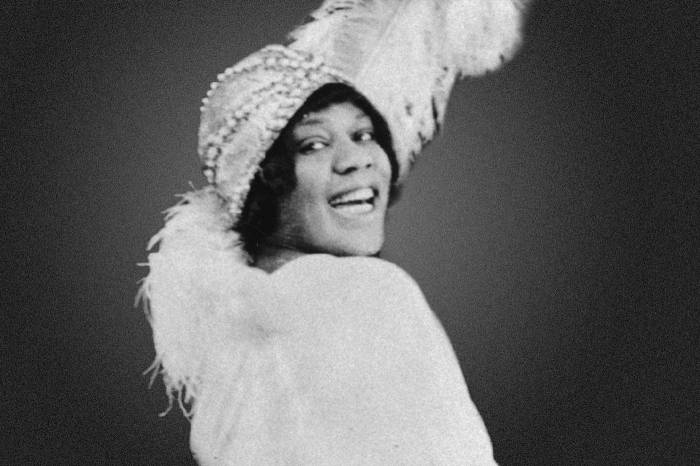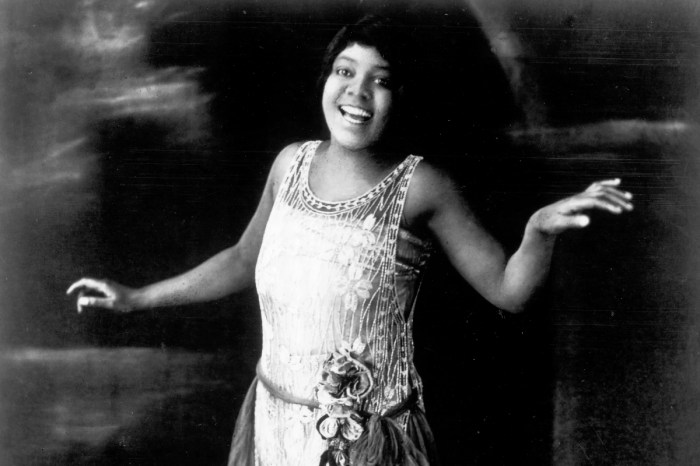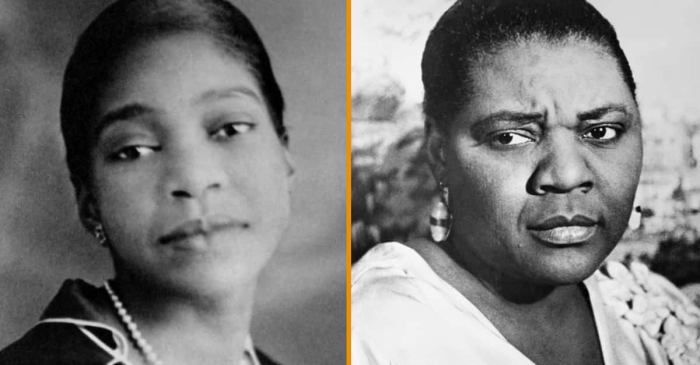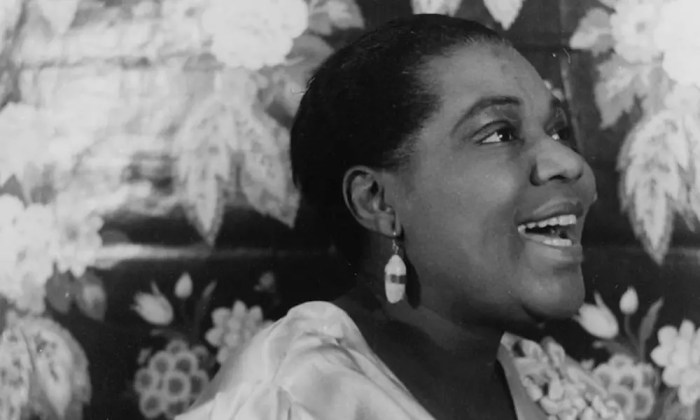Empress of the blues blank smith – Bessie Smith, the legendary “Empress of the Blues,” emerges as a captivating figure in the annals of music history. Her powerful voice, improvisational brilliance, and emotional delivery transformed the blues genre, leaving an enduring mark on American culture.
From her humble beginnings to her rise as a cultural icon, Bessie Smith’s journey is a testament to resilience, talent, and the transformative power of music.
Biography of Empress of the Blues, Bessie Smith

Bessie Smith, hailed as the “Empress of the Blues,” was an iconic American blues singer whose powerful vocals and captivating stage presence left an indelible mark on the music industry. Born in Chattanooga, Tennessee, on April 15, 1894, Smith’s early life was marked by poverty and adversity.
Smith’s family struggled financially, and she was forced to sing on the streets and in local bars to earn money. Her raw talent and unique vocal style caught the attention of Ma Rainey, a renowned blues singer who became her mentor.
Under Rainey’s guidance, Smith developed her signature style, characterized by its emotional intensity and expressive phrasing.
Timeline of Bessie Smith’s Career
Smith’s career took off in the early 1920s when she signed a contract with Columbia Records. She quickly became one of the most popular blues singers of the era, releasing a string of hit songs, including “Downhearted Blues” (1923) and “St.
Louis Blues” (1925). Her powerful voice and captivating stage presence made her a sensation, and she toured extensively throughout the United States and Europe.
- 1912: Began singing on the streets of Chattanooga.
- 1920: Met Ma Rainey and began her musical career.
- 1923: Signed a contract with Columbia Records.
- 1925: Released “St. Louis Blues,” her biggest hit.
- 1929: Toured Europe with great success.
- 1937: Died in a car accident at the age of 43.
Personal Life and Relationships
Smith’s personal life was often tumultuous. She had several relationships, including a marriage to Jack Gee, a musician. However, her relationships were often marred by violence and infidelity. Smith’s personal struggles and heartaches often found their way into her music, giving her songs an added depth and emotional resonance.
Musical Style and Impact: Empress Of The Blues Blank Smith

Bessie Smith’s distinctive vocal style and captivating stage presence made her a legendary figure in blues music. Her powerful, emotive voice, improvisational skills, and raw emotional delivery left an indelible mark on the genre.
Genres and Influences, Empress of the blues blank smith
Smith’s music drew inspiration from a range of genres, including blues, jazz, and vaudeville. Her blues songs often showcased her ability to convey personal pain and hardship with raw emotion, while her jazz-infused numbers demonstrated her improvisational skills and vocal dexterity.
- Blues:Smith’s blues recordings are characterized by their raw emotional intensity and deeply personal lyrics.
- Jazz:Smith’s jazz performances showcased her improvisational skills and ability to swing.
- Vaudeville:Smith’s early career in vaudeville influenced her theatrical stage presence and ability to connect with audiences.
Impact on Subsequent Generations
Bessie Smith’s influence on subsequent generations of blues artists is immeasurable. Her powerful vocals and emotional delivery inspired countless singers, including Billie Holiday, Dinah Washington, and Aretha Franklin.
- Billie Holiday:Holiday’s unique vocal style and phrasing were heavily influenced by Smith.
- Dinah Washington:Washington’s powerful vocals and emotional delivery were reminiscent of Smith’s.
- Aretha Franklin:Franklin’s gospel-infused vocals and stage presence were inspired by Smith.
Cultural Significance and Legacy

Bessie Smith’s contributions to American culture and society were profound. As a cultural icon, she challenged racial and gender stereotypes, paving the way for future African American women in music. Her raw and emotive performances captivated audiences, breaking down barriers and fostering a greater appreciation for the blues genre.
Trailblazing for African American Women in Music
Smith’s success in the male-dominated music industry was groundbreaking. She shattered preconceived notions about the capabilities of African American women and inspired countless aspiring artists. Her determination and resilience became a symbol of hope and empowerment for those facing similar challenges.
Elevating the Blues Genre
Smith’s artistry played a pivotal role in legitimizing the blues genre. Her powerful vocals and sophisticated phrasing showcased the genre’s depth and emotional resonance. By performing in prestigious venues and collaborating with renowned musicians, she elevated the blues from its marginalized status to a respected art form.
Enduring Impact on American Culture
Bessie Smith’s legacy continues to resonate today. Her music has influenced generations of musicians across genres, from jazz and rock to rhythm and blues. Her recordings remain popular and widely studied, providing a timeless testament to her talent and the enduring power of the blues.
Personal Struggles and Triumphs
Bessie Smith’s life was marked by both challenges and triumphs as a black woman in the early 20th century.She faced significant hardships due to poverty, racism, and health issues. Born into a poor family, Smith struggled financially throughout her life, often living in squalid conditions.
She also experienced racism and discrimination in her personal and professional life, including being denied access to certain venues and being subjected to verbal and physical abuse. Additionally, Smith suffered from various health problems, including syphilis, which eventually contributed to her untimely death.Despite
these challenges, Smith displayed remarkable resilience and determination. She refused to let adversity define her and instead used her talent and strength to overcome obstacles. Smith’s unwavering spirit and ability to persevere through hardships serve as an inspiration to many.
Poverty and Discrimination
Growing up in poverty, Smith often went hungry and lacked access to basic necessities. She began performing at a young age to help support her family, but her earnings were meager. As she gained recognition as a blues singer, Smith faced discrimination from both white and black audiences.
White audiences were often uncomfortable with her raunchy lyrics and powerful stage presence, while some black audiences criticized her for not being “ladylike” enough.
Health Issues
Smith’s health declined significantly in the later years of her life. She was diagnosed with syphilis, which caused her severe pain and eventually led to her death in 1937. Despite her declining health, Smith continued to perform and tour, determined to support herself and her family.
Her dedication to her craft, even in the face of adversity, is a testament to her strength and resilience.
Overcoming Adversity
Smith’s ability to overcome adversity stemmed from her unwavering determination and self-belief. She refused to let poverty, racism, or health issues hold her back. Instead, she used her talent and strength to rise above these challenges and achieve success. Smith’s resilience and perseverance serve as an inspiration to many, reminding us that it is possible to overcome obstacles and achieve our dreams, regardless of our circumstances.
Cultural Context and Social Commentary

Bessie Smith’s music emerged during the Jim Crow era, a time of intense racial segregation and discrimination in the United States. Her music reflected the lived experiences and struggles of African Americans during this period.
Smith’s lyrics often addressed themes of poverty, racism, and the challenges faced by marginalized communities. Songs like “Backwater Blues” and “Nobody Knows You When You’re Down and Out” captured the economic hardships and social isolation experienced by many African Americans.
Music as Social Commentary
Smith’s music served as a powerful form of social commentary, highlighting the injustices and inequalities faced by her community. Through her songs, she gave voice to the experiences of the marginalized and challenged prevailing social norms.
- Her performance of “Strange Fruit,” a song about the lynching of African Americans, became an anthem of the Civil Rights Movement.
- Songs like “Gimme a Pigfoot (And a Bottle of Beer)” and “Downhearted Blues” addressed the economic and social struggles of working-class African Americans.
Collaborations and Influence on Other Artists

Bessie Smith’s exceptional talent and magnetic stage presence made her a sought-after collaborator among renowned musicians and artists of her time. These collaborations not only enriched her music but also played a pivotal role in shaping her career.
Notable Collaborations
- Louis Armstrong: Smith collaborated with Armstrong on several recordings, including “St. Louis Blues” and “Cold in Hand Blues.” Their collaboration showcased the perfect blend of Smith’s powerful vocals and Armstrong’s innovative trumpet playing.
- Fletcher Henderson: Henderson arranged and conducted the orchestra on Smith’s recordings from 1923 to 1933. His sophisticated arrangements elevated Smith’s music, adding depth and complexity to her performances.
- James P. Johnson: Johnson, a renowned pianist and composer, collaborated with Smith on several recordings, including “Backwater Blues” and “Careless Love.” His virtuosic piano playing provided a solid foundation for Smith’s vocals, creating a captivating musical tapestry.
Impact on Other Blues Musicians
Smith’s influence on blues music and performers cannot be overstated. Her raw and emotional vocals, combined with her innovative approach to phrasing and improvisation, inspired countless blues musicians who followed in her footsteps.
- Billie Holiday: Holiday, often被称为“爵士乐夫人”,受到史密斯的强烈影响。她学习了史密斯对声音的控制和情感传递,并将其融入自己的音乐中。
- Ma Rainey: Rainey, another legendary blues singer, was a mentor to Smith. Rainey’s powerful stage presence and vocal style influenced Smith’s early performances.
- Muddy Waters: Waters, a pioneer of Chicago blues, credited Smith as a major influence on his music. He admired her ability to convey raw emotions and connect with audiences.
Bessie Smith’s collaborations and influence on other artists solidified her position as a legendary figure in blues music. Her collaborations brought together some of the most talented musicians of her time, creating timeless recordings that continue to captivate audiences today.
Moreover, her influence inspired generations of blues musicians, shaping the sound and direction of the genre for years to come.
Historical Impact and Recognition
Bessie Smith’s legacy extends far beyond her lifetime. Her exceptional talent and contributions to the music industry have earned her a place among the most influential figures in American history.
Induction into the Rock and Roll Hall of Fame
In 1989, Bessie Smith was inducted into the Rock and Roll Hall of Fame, becoming one of the first women and the first blues artist to receive this prestigious honor. Her induction recognized her profound impact on popular music, particularly her role in shaping the development of blues and jazz.
Bessie Smith Cultural Center
In 1994, the Bessie Smith Cultural Center was established in her hometown of Chattanooga, Tennessee. The center is dedicated to preserving and celebrating Smith’s legacy through exhibitions, performances, and educational programs. It serves as a testament to her enduring influence and the importance of her contributions to American culture.
Legacy and Celebrations
Bessie Smith’s legacy continues to be celebrated and honored in various ways. Her music is still widely enjoyed and studied, and her image and name are often referenced in popular culture. Numerous festivals, concerts, and events are held annually in her honor, ensuring that her memory and impact remain vibrant.
Questions Often Asked
What were some of Bessie Smith’s most famous songs?
Some of her most iconic songs include “Downhearted Blues,” “St. Louis Blues,” and “Nobody Knows You When You’re Down and Out.”
How did Bessie Smith’s personal life influence her music?
Her experiences with poverty, racism, and heartbreak found expression in her blues lyrics, adding depth and authenticity to her performances.
What was Bessie Smith’s impact on the blues genre?
She helped popularize the blues and paved the way for future generations of blues musicians. Her powerful vocals and improvisational skills set a new standard for the genre.